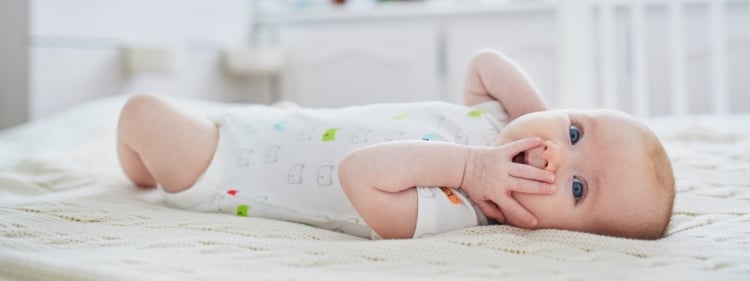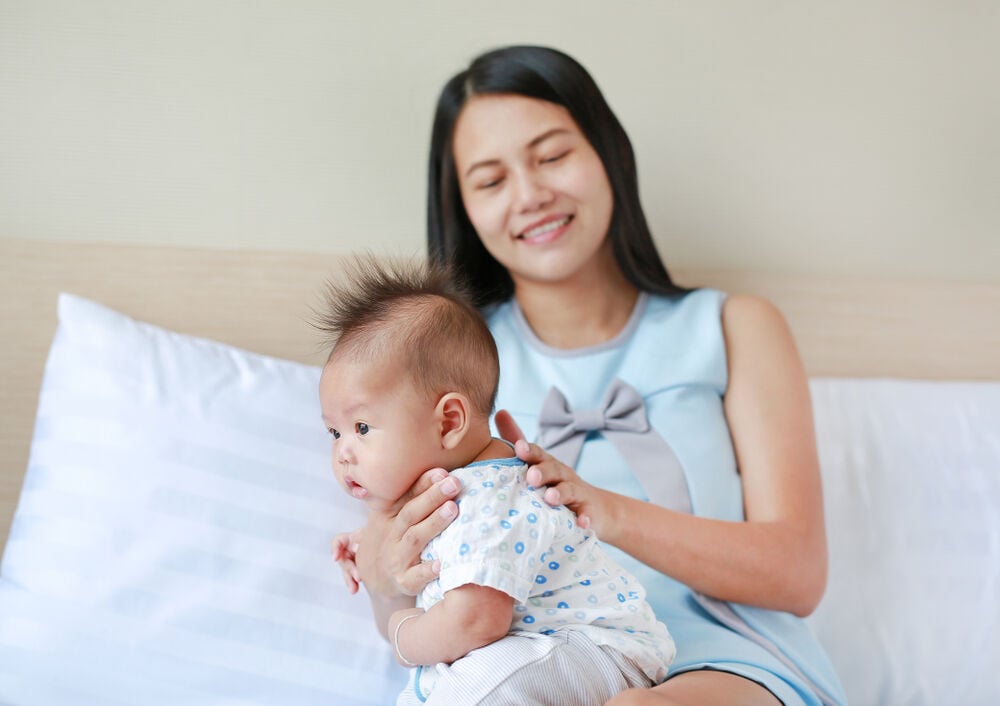-
Tracking cycle
-
Getting pregnant
-
Pregnancy
-
Help Center
-
Flo for Partners
-
Anonymous Mode
-
Flo app reviews
-
Flo Premium New
-
Secret Chats New
-
Symptom Checker New
-
Your cycle
-
Health 360°
-
Getting pregnant
-
Pregnancy
-
Being a mom
-
LGBTQ+
-
Quizzes
-
Ovulation calculator
-
hCG calculator
-
Pregnancy test calculator
-
Menstrual cycle calculator
-
Period calculator
-
Implantation calculator
-
Pregnancy weeks to months calculator
-
Pregnancy due date calculator
-
IVF and FET due date calculator
-
Due date calculator by ultrasound
-
Medical Affairs
-
Science & Research
-
Pass It On Project New
-
Privacy Portal
-
Press Center
-
Flo Accuracy
-
Careers
-
Contact Us
How to Get Rid of Baby Hiccups? Newborn Hiccups Explained

Every piece of content at Flo Health adheres to the highest editorial standards for language, style, and medical accuracy. To learn what we do to deliver the best health and lifestyle insights to you, check out our content review principles.
What causes hiccups in babies
Baby hiccups occur due to the contraction of the baby's diaphragm, along with the prompt closing of the vocal cords. During this process, the air leaves the vocal cords forcefully and creates the sound of hiccups. The exact cause of this isn’t known, but baby hiccups are often linked to eating, drinking, and strong emotions including stress or excitement.
Unlike adults, however, hiccups in babies usually don’t affect them. Many babies are able to sleep uninterrupted during a hiccuping bout, and hiccups don’t interfere with the breathing of the baby.
Baby hiccups after eating
Your baby may develop hiccups after eating or drinking, especially if they swallow air during the feed (either breastfeeding or formula feeding). Hiccups in newborns may also occur if they overfeed or eat too quickly. All these factors may cause the stomach of the baby to expand, which pushes against the diaphragm and triggers a spasm, leading to baby hiccups.
If your newborn has hiccups frequently and they cause distress, it may be due to gastroesophageal reflux (GER). In this condition, the esophageal sphincter isn’t developed properly and partially-digested food mixed with stomach acid may regurgitate through the esophagus (food pipe). As the stomach content passes through the baby’s diaphragm, it can trigger spasms and hiccups.
What to do when a newborn has hiccups
Hiccups in a newborn usually don’t cause any harm. Unlike for adults, hiccups are less uncomfortable for babies and tend not to provoke any distress. So, what can you do for baby hiccups? Many times, baby hiccups get better by themselves. If the hiccups aren’t disturbing your child, simply leave them to get better on their own. When the hiccups in your baby aren’t due to feeding, you can give him or her a pacifier to suck, which helps relax the diaphragm and stop the hiccups.
How to get rid of baby hiccups
To get rid of baby hiccups, try burping in between feeding and offering the baby gripe water. You may also rub their back or rock back and forth to stop baby hiccups, as this helps the baby to calm down and relax, stopping the spasm of the diaphragm and, of course, the hiccups. Be sure not to hit or slap the back roughly or apply excessive force.
How to stop baby hiccups after feeding

To stop baby hiccups after feeding, you can try the following:
- Take a break from feeding and burp your child. This helps remove the excess gas in their stomach that may be irritating the diaphragm and causing hiccups. It also puts the baby in an upright position, which can be beneficial. According to the recommendations by the American Academy of Pediatrics, you should burp your infant (if they're bottle-fed) after every two to three ounces. You should burp your breastfed baby in between switching breasts.
- If your baby hiccups a lot during feeding (both breastfeeding and formula feeding), you may slow the feeding so that your baby can take their time and feel relaxed.
- You may give your baby some gripe water to relieve the hiccups. Gripe water is a blend of water and herbs that is traditionally used to relieve colic and stomach discomfort. The herbs may include fennel, chamomile, cinnamon, and ginger. Though no scientific proof exists to support the idea that gripe water helps relieve baby hiccups, it carries low risk and many parents say it helps. Before introducing a new product to your baby, discuss it with your doctor. Some herbs may cause an allergy in infants.
Take a quiz
Find out what you can do with our Health Assistant
How to prevent hiccups in babies
While there are some ways to help prevent the onset of baby hiccups, it’s difficult to avoid them completely since the cause isn't always known. Try the following ways to prevent hiccups in babies:
- Ensure your infant is calm and relaxed during feedings. Don’t wait until they become upset and start crying due to hunger before offering a feeding.
- Try to feed your infant in an upright position.
- After every feed, hold your infant upright for about 25 to 30 minutes.
- Give your baby smaller feeds at short intervals of time.
- If you feed your child by bottle, try to reduce the amount of air they swallow. Tilt the bottle until the milk fills the nipple completely before giving it to the baby.
- Make sure the hole in the bottle's nipple is not too big or too small for your baby. When you tip the bottle, a few drops of milk or formula should come out.
- While breastfeeding, ensure your baby's mouth is latched properly over your whole nipple.
- Avoid doing high-energy activity with your baby after feeding, including boisterous playing or bouncing up and down.
Reasons to call a doctor
Hiccups in newborns are usually considered normal until the child reaches the age of one year. However, if your baby hiccups a lot and seems agitated or upset while hiccuping, you should consult a pediatrician as this may indicate other medical conditions.
GER may result in frequent and uncomfortable baby hiccups. Apart from hiccups, the following symptoms indicate that GER may be an issue:
- Crying more than usual, especially when you feed the baby
- Problems gaining weight
- Arching the spine (back) excessively, especially after or during feedings
- Spitting up more than usual
If you suspect that your baby may be suffering from GER, talk to a doctor, as they can easily treat this condition. You should also talk to a pediatrician if the hiccups are disturbing the sleep of your baby, or if hiccups continue occurring even after your child turns one year old.
Hiccups in babies are a normal occurrence until about the age of one year. Hiccups usually don’t affect babies and they may even sleep through a hiccuping bout. Baby hiccups occur when the diaphragm contracts and the vocal cords promptly close. In a newborn, they may occur after feeding, particularly if the baby swallowed air while feeding, overfed, or fed too quickly. To stop baby hiccups, try burping the baby regularly during feeding, offer a pacifier, or give the baby some gripe water. If your baby hiccups a lot and looks agitated or upset while hiccuping, consult a doctor. This may indicate a medical condition such as GER, which is easily treatable.


Hey, I'm Anique
I started using Flo app to track my period and ovulation because we wanted to have a baby.


The Flo app helped me learn about my body and spot ovulation signs during our conception journey.


I vividly
remember the day
that we switched
Flo into
Pregnancy Mode — it was
such a special
moment.
Real stories, real results
Learn how the Flo app became an amazing cheerleader for us on our conception journey.




